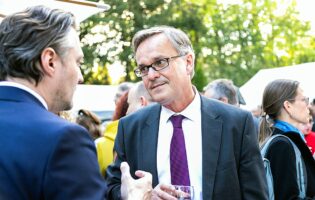Post-Unification German Studies: Momentum Gained or Lost?

Frank Trommler
University of Pennsylvania
Frank Trommler is Professor Emeritus of German at the University of Pennsylvania, where he has been a member of the Department of Germanic Languages and Literatures since 1970. He has taught courses in German language, literature and culture in the nineteenth and twentieth centuries and, since 1985, also in Comparative Literature. He chaired the Department in 1980-86 and several times since 1994 as acting chair. In 1996-2000 he also served as acting chair of Penn’s Department of Slavic Languages.
A Guggenheim Fellow in 1984/85, Trommler was President of the AATG chapter Philadelphia in 1986-1990, President of the German Studies Association in 1991/92, and Director of the Humanities Program at the American Institute for Contemporary German Studies in Washington, DC, from 1995-2003. In 1994 he was awarded the Bundesverdienstkreuz by the President of the Federal Republic for his work in the field of American-German relations.
His publications include Roman und Wirklichkeit (1965), Sozialistische Literatur in Deutschland (1976), Die Kultur der Weimarer Republik (1978, with Jost Hermand, several reprints), America and the Germans (1985, also in German), Germanistik in den USA (1989), Thematics Reconsidered (1995), The Cultural Legitimacy of the Federal Republic (1999), Berlin: The new Capital in the East (2000), The German-American Encounter (2001, also in German), Weimars transatlantischer Mäzen: Die Lincoln-Stiftung 1927-1934 (2008). In 1995-2003 he edited fourteen volumes of the AICGS Humanities Series on Contemporary German Studies. A Festschrift in his honor appeared in 2004 under the title, The Many Faces of Germany, edited by John McCarthy, Walter Grünzweig, and Thomas Koebner.
Emeritus professor since 2007, Trommler published the first comprehensive study of German cultural diplomacy with France, Britain, United States, Russia, Poland, and Italy in 2014 under the title, Kulturmacht ohne Kompass: Deutsche auswärtige Kulturbeziehungen im 20. Jahrhundert (Cologne: Böhlau).
In 2014 he received the honorary degree of Doctor of Modern Languages at Middlebury College, Vermont, at the occasion of the 100th anniversary of the Middlebury Language School which was founded by the German professor Lilian Stroebe in 1915. The event united over a hundred MA and PhD graduates of the summer immersion programs in ten languages.
Carl Bildt, until recently Sweden’s foreign minister, told Thomas Friedman of the New York Times in 2003: “For a generation Americans and Europeans shared the same date: 1945. A whole trans-Atlantic alliance flowed from that postwar shared commitment, free markets and the necessity of deterring the Soviet Union. America saw the strength of Europe as part of its own front line and vice versa and this bond made the resolution of all other issues both necessary and possible.”
Bildt then turned from the date 1945 to two other dates that clearly reveal a divide: “Today, however, we are motivated by different dates. Our defining date is now 1989 and yours is 2001. Every European prime minister wakes up in the morning thinking about how to share sovereignty, as Europe takes advantage of the collapse of communism to consolidate economically, politically and militarily into one big family. And the U. S. president wakes up thinking about where the next terror attack might come from and how to respond – most likely alone.”[1]
Of course, this was a decade ago. And yet, it seems that Americans, in their perceptions of contemporary politics, still define themselves strongly by 9/11 while the fall of the Berlin Wall and the whole communist edifice has become part of a more glorious past. In Europe and especially in Germany the events of 1989 are still more a reference point for the understanding of politics than 9/11. This difference, though lessened in recent years thanks to the increasing terrorist threats, might also impact the framework in which German affairs are being researched and taught in American schools and colleges. It might help understand what has happened to German Studies as it has been defined and practiced in the U. S. since the late 1980s when a younger generation of college teachers felt the need to break away from the traditional methods in the disciplines of History and Germanistik and develop a more holistic and interdisciplinary approach to German history, politics, and culture.
There can be no doubt that the unification of the two German states that unleashed a flood of political, administrative, economic, and psychological problems provided fertile grounds for a surge in interest in German affairs both in the public realm and in college classrooms. German Studies, encompassing cultural and aesthetic as well as political and historical knowledge fields, went through an expansion that was most welcome after the decline in interest in the 1980s. As the demolition and rebuilding of political structures did not by themselves yield information about the inner stories of Germans in East and West, interdisciplinary and especially cultural studies seemed to provide more insights than the customary political analysis.
In retrospect the 1990s became the decade of discoveries and rediscoveries that helped recruit a new generation of American academics for the pursuit of German Studies. For this new generation the Wende of 1989 signified the basis for their understanding of Germany. The opening of political archives provided new information about the earlier years of the Federal Republic; most welcome was the opening of East German archives (the SAPMO materials in the Bundesarchiv) without the thirty-year waiting period and the unlocking of the Stasi files, as cumbersome as the access often was.
The agenda of AGI—the American Institute for Contemporary German Studies—in the 1990s is a case in point. Its successful application to the National Endowment for the Humanities provided sizeable funds for a humanities program, later the Harry & Helen Gray Humanities Program, that drew a public audience in Washington in addition to broadly resonating ventures in the study of German politics and economics. Similarly, the themes of the annual conferences of the German Studies Association highlighted the cultural ramifications of the history of Nazism, the Holocaust, and the postwar stories of the two Germanies for the study of German affairs. Carried by the temporary curiosity about what had happened in that sealed-off part of Germany during the Cold War, studies of East Germany, the former German Democratic Republic, received sizeable funding. AGI launched a series of workshops on the dismantling of the East German cultural apparatus (in literature, visual arts, music, film, and the press) to which several East German participants and Zeitzeugen were flown in.
Yet the decade of discoveries and new engagements was over before it was over. Upon the victory in the Cold War, many American institutions saw the profit of the much conjured “peace dividend” in the short-sighted freeing from investing in research in local knowledge or, academically speaking, area studies. With considerable German sources of funding, German Studies survived severe cuts but suffered from the waning interest in the country that, thanks to the financial burdens and miscalculations of unification, was soon called the sick man of Europe. Two issues received special attention that moved the discussion beyond the emotional clashes between Ossis and Wessis and the repulsed fascination with the Stasi: how Germans would handle the terrible legacy of the Holocaust in their newly united successor state to the Third Reich, and how they would handle the integration in the complicated mingling of European countries under one roof.
Enter the shock of the terrorist attacks at the World Trade Center in New York in 2001. It opened a different chapter of American relations with the world. Carl Bildt’s remarks leave no doubts about the intense shift away from the prevailing reference to the end of communism as a moment of empowerment for the leading power of the Western World. Did it also lead to a reorientation of the public and academic relationship with Germany? Did American scholars and teachers move away from the year 1989 as the crucial reference for their work? Or did they attempt to occupy a position between the two references that Bildt had outlined?
These questions might help define the changing horizon of transatlantic relations in the early twenty-first century. Yet they presume a closeness between the main players that had eroded already years before the attack. With the replacement of the Kohl government by that of Gerhard Schröder and Joschka Fischer in 1998, the growing distance between the newly independent Germany and the United States was carried into the open. More lasting than the loud manifestations of solidarity in Germany after 9/11 was the decision not to join the United States in the attack against Iraq’s Saddam Hussein in 2003. Scholars and teachers might have felt both abandonment and liberation, most definitely more of the distance.
Was it a new orientation? This seems to overstate the reaction to the developments. What can and should be mentioned, however, are two changes that have impacted political scholarship as well as academic teaching in a very general sense. One fundamental change affected the ways that Germany was perceived once the unified country had become a reality on the European map. Focusing on its long-maintained special role—a self-assuring teaching tool during the Cold War—became obsolete. The client state of the United States, whose fortunes were intricately bound up with the policies of the Western superpower, had advanced into a country like any other country, maybe a bit more powerful, maybe a bit more like an economic competitor. The other fundamental change that impacted German Studies did not emanate from politics but rather from the enormous transformation through computer technology that resulted in instant communication across borders, digitization of teaching and research materials, and democratization of information. It has sidelined many traditional doorkeepers in research and teaching who are forced to find new ways of exerting authority and originality. It requires constant revamping of research and teaching agendas.
Clearly, a different momentum is moving German Studies now.
Dr. Frank Trommler is Professor Emeritus of German at the University of Pennsylvania and was the Director of the Harry & Helen Gray Humanities Program at AGI from 1995-2003.
[1] Thomas L. Friedman, “The End of the West?” New York Times, 2 November 2003, WK 11.








